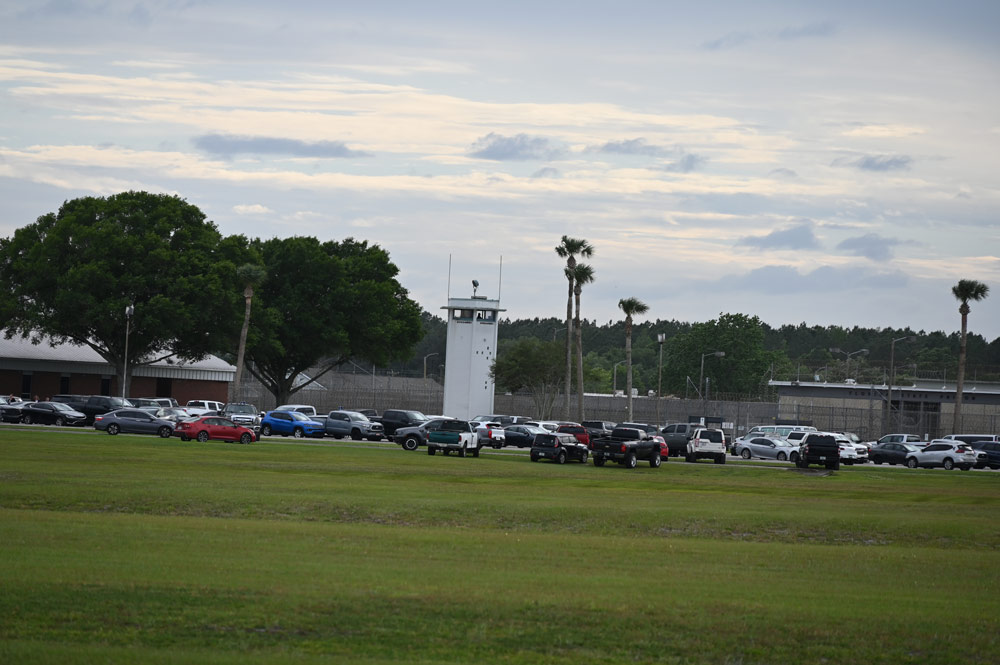
Sounding as desperate as he ever has since being appointed four years ago, Florida Department of Corrections (FDC) Secretary Ricky Dixon asked a panel of state lawmakers Wednesday for more than $512 million for next fiscal year to maintain the prison system.
“It is a staggering amount of money that we’re asking for. I’m aware of that,” Dixon told the Senate Appropriations Committee on Criminal and Civil Justice. Adding to the scale of the needs, he said that amount did not include funding for salaries of correction officers, which he said rank among the lowest for its size in the country.
“If I continue to do this job, we’re going to have to have the support we need, because we cannot keep going in the direction we’re going in,” he added for emphasis.
Florida houses more than 89,000 inmates in its corrections system, a population that has increased by more than 10,000 since 2021. That is expected to rise by another 4,100 over the next three years.
“We are managing today with relatively the same number of staff we had 10,000 inmates ago, so you can imagine what that’s doing to the staff and inmate ratios,” Dixon said.
The system includes officers as young as 19 with fewer than two weeks’ experience supervising more than 150 inmates in some correction facilities. That’s compared to ratios of one officer to 35 or one officer to 50 inmates in other states, he added.
Starting salaries for Florida correction officers begin at $22 an hour, an annual salary of $45,760. That pales in comparison to nearby Alabama, where legislators two years ago raised the minimum annual salary for correction officer trainees to more than $55,000 at a maximum secure facility (and Dixon said it actually went as high as $73,000).
Funding issues aren’t new
The numbers Dixon cited should have surprised none of the lawmakers on the committee. Many of them served in the Senate a few years ago when a study by the consulting firm KPMG recommended the state immediately appropriate more than $2 billion for immediate repairs and to develop a strategy to modernize the system.
The report added that the full costs of modernizing the state’s prison system would range between $6 billion and nearly $12 billion.
Among some of the specific requests by Dixon is $155 million in operational needs; $60 million in inmate health services; $56.4 million in new housing units; $45 million in drug costs; and $22 million in critical security equipment.
“What this does not include is the pay,” Dixon said, adding that he hopes to “remain competitive” on salaries.
Overtime costs piling up
Reviewing state records showing that the Department of Corrections spent $150 million on overtime last year, Sen. Clay Yarborough, R-Jacksonville, asked Dixon why the state was paying “such a vast amount.”
Dixon cited the addition of approximately 10,000 inmates in recent years.
“They have to live somewhere,” he said. “We have to reopen the dorms that we’re previously closed. We don’t have staffing for those dorms, so we have to pull staffing from one shift to the next and it requires a lot of double shifts to man those dorms. So, that drives that overtime rate up.”
While this Senate committee is focused on funding, not policies, Sen. Rosalind Osgood, D-Fort Lauderdale, mused to Dixon about reducing the state’s inmate population by allowing some elderly prisoners to be released. “Geriatric parole” is legislatively authorized in 24 states around the country, according to the National Conference of State Legislatures.
“If I had been in jail 20 to 25 years and I haven’t killed a bunch of people [or] did something horrific, maybe I was just high chasing drugs — I don’t know — but we gotta begin to look at adding some measure of grace for people who we can be comfortable with that they paid a consequence and maybe looking to spend money to transition them back into society in a more cost effective way,” she said.
“I stay in my lane when it comes to who should be in our system and who shouldn’t be,” Dixon replied. “That’s worthy of debate and certainly is debated and should continue to be debated.”
Those debates haven’t taken place in the Florida Legislature, however. One specific measure that would have allowed certain long-time prison sentences to become parole-eligible under certain circumstances introduced in the 2025 legislative session never received a hearing in any committee.





























Deborah Coffey says
When will Americans admit that Republicans just can’t or won’t govern?
AI says: In the post-World War II era, most U.S. recessions began while a Republican was president. A 2024 analysis by the Joint Economic Committee Democrats found that 10 of the 11 recessions between 1953 and 2020 began during a Republican administration. A 2024 Harvard Kennedy School analysis of 11 recessions since 1953 found the same result: 10 started under Republican presidents.
(The 11th recession was caused by an oil embargo in the 1970’s)
Jim says
I don’t expect the legislature to come up with any money for this. What I do predict is that, at some point, there will be a serious incident in one or more prisons where inmates, guards and others are killed in a riot of some type. After that happens, the legislature will come up with money. I feel for the guards working in this system. I think I’d seriously try to find a job doing something else.
Pogo says
@Welcome
… to anarchy.
Eat up, it’s all that there is.